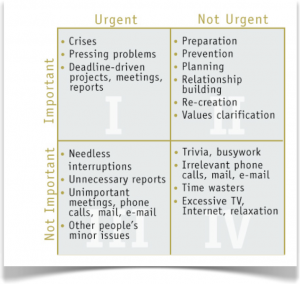Busyness is a given and is not unique to pastoral ministry. But make no mistake, busyness is often more of a problem, than more of a sign of effectiveness. I have always wrestled with personal focus, whether practicing my trumpet in high school band, or finishing a paper in college. Procrastination could be my first, middle, and last name. Time and life management has always been a struggle. But it has become a major pursuit as well; one in which I trust I am making progress.
Challenges to Productivity
 Sin. Sin steals time. Whether misplaced conversation, inappropriate activities, or laziness in and of itself, sin steals time. When activities of life that are not faith-founded dominate the schedule, sin is present. Sin is never productive, not in the long run – rarely in the short run, never for things eternal. No real need to get too specific here. Sin steals time. You probably know how that shows up in your life. I am quite well aware of how it shows up in mine.
Sin. Sin steals time. Whether misplaced conversation, inappropriate activities, or laziness in and of itself, sin steals time. When activities of life that are not faith-founded dominate the schedule, sin is present. Sin is never productive, not in the long run – rarely in the short run, never for things eternal. No real need to get too specific here. Sin steals time. You probably know how that shows up in your life. I am quite well aware of how it shows up in mine.
Family. I don’t mean to suggest that productivity is more important than time spent with family. I don’t believe that and would never advocate it. However, I am quite sure that family requests, kid’s desires, and even legitimate, necessary family needs prove challenging to your being productive. Productivity may mean staying up later, or in my case getting up earlier, so that family is not inappropriately neglected. Nonetheless, family responsibilities are always a challenge to being productive in your work.
Unintentionality. This may be one of the biggest challenges. Simply having no intentional plan regarding your priorities and how those priorities work themselves out each week in your schedule is a sure sign that unintentionality is not merely a challenge to your productivity, but probably a victor over it. I don’t advocate scheduling every minute of your day (only the President has such a staff to support that). But do you schedule those things that are very important, but likely not immediately urgent, and therefore, most likely to be neglected due to the tyranny of the urgent? If not, then unintentionality plagues your productivity.
 Expectations. The desires and expectations of others are a challenge to your productivity. This is especially true of the pastorate. If you have a multi-generational church you obviously will have a multi-expectational church when it comes to what you should be doing with your time. Every generation has its expectations and when they are unmet, the poor offending pastor (typically of a different generation) receives their critique. This is why it is all the more important that a pastor understand his priorities, those priorities have biblical mandate, and that those priorities are being chiseled into his calendar each week. I heard C.J. Mahaney once say something to the effect of, “I know that I am going to disappoint someone this week because I have to say ‘no’ to them; I need to have a good reason for doing so.”
Expectations. The desires and expectations of others are a challenge to your productivity. This is especially true of the pastorate. If you have a multi-generational church you obviously will have a multi-expectational church when it comes to what you should be doing with your time. Every generation has its expectations and when they are unmet, the poor offending pastor (typically of a different generation) receives their critique. This is why it is all the more important that a pastor understand his priorities, those priorities have biblical mandate, and that those priorities are being chiseled into his calendar each week. I heard C.J. Mahaney once say something to the effect of, “I know that I am going to disappoint someone this week because I have to say ‘no’ to them; I need to have a good reason for doing so.”
Image. Unfortunately, we are creatures who naturally crave approval – so image, rather than biblical significance, can often determine what we give our time to, making productivity a slave to perception rather than priority. Some pastors fall into the trap (sometime unwittingly) of thinking that their effectiveness in the congregation is somehow tied to their being able to be perceived as busy. Perhaps image becomes a slave to other’s expectations. This is dangerous for the long-term health of the church as well as the pastor’s own spiritual well-being. Image is an enslaving and spiritually life-sapping trap of which we must always be on guard.
Urgency. The tyranny of the urgent is a powerful phrase and is the title of a great little book. Franklin-Covey’s Time Matrix chart is well worth considering when analyzing whether you are run by the urgent and unimportant or if you are really living in the more productive quadrant of non-urgent but important. The more you are driven by the immediate, the less productive you will be. The more you drive your life and schedule by biblical priority, the more you will see the urgent become less frequent and even less devastating when it does appear.
What do you find to be the greatest challenges to your own personal productivity?







